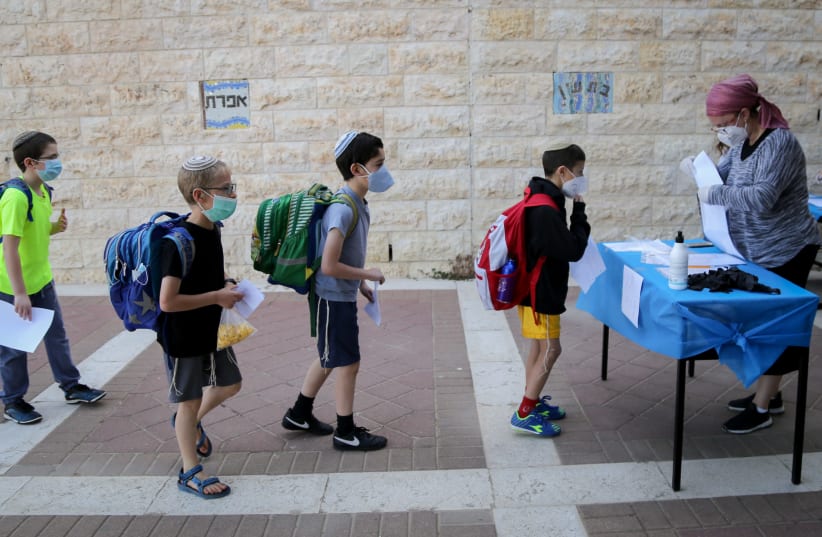Two neighborhoods in the Bedouin town of Hura will remain on lockdown until Sunday, the Prime Minister’s Office and the Health Ministry said Tuesday.
The town has the highest increase of coronavirus infection in the country – increasing by 19.4% in the last three days. Last week, the town of 16,983 people was deemed a “red zone,” after a number of residents contracted SARS-CoV-2 at a large wedding.
A Health Ministry official told N12 that the concern is that many of the residents of Hura work in Beersheba and could infect others. He told the station that many residents who have symptoms do not get tested as they have a cultural belief that having the virus is “shameful.”
Beersheba is one of the Jewish towns with the highest rate of infection, although it is low enough that it has not been classified as a restricted area. A Health Ministry report showed a 1.75% increase in the last three days and 180 people infected.
Other former hot spots are seeing a decline in cases. Haredi (ultra-Orthodox) Bnei Brak and Jerusalem each reported only 11 new patients in the last three days.
In general, active cases of the virus are on the decline. At press time, there were only 5,586 people infected with corona – 376 less than the day before. Some 238 people have died and 70 are intubated. So far, 10,465 people have recovered – almost twice as many as those who are currently infected.
As the infection rate decreases, Israeli freedom expands – and on Sunday, preschoolers between the ages of three and six will return to school. Teachers and aides will use the coming days to prepare their classrooms to welcome students in a safe way.
“As part of the gradual return of the entire education system, the government has decided to adopt the ministry's layout and return to regular preschool activities,” Education Minister Rafi Peretz said on Tuesday.
“I instructed the professional staff to work with maximum efficiency to reach a high level of readiness by Sunday,” he said. “The parents will return to work, and thus the economy will return to activity. And the children will return to their daily routine, with the utmost strict adherence to the Health Ministry guidelines.”
However, the plan is complicated for working parents, as children will only be in school from 7:55 a.m. until 2 p.m. The classes will be broken into two consistent groups of up to 18 students, which will only attend school three days a week.
While at school, the children will be divided into two additional groups that will learn and play separately in different areas of the classroom and playground. The staff will be allowed to move students from one area to another, with an emphasis on following the rules of hygiene, especially hand washing.
Students will be asked to bring their own food and eat it at separate tables two meters apart.
Education Ministry director-general Shmuel Abuav said he expects that only around half of the parents will send their children to preschool on Sunday due to the restricted schedule, but said that he and his team are working diligently to open after-school programs within the next two weeks.
On Sunday, Israeli students in grades 1-3 started returning to school. The government confirmed Monday night that if the coronavirus infection rate continues to decline, students in grades 4-10 will return to school by June 1.
A student enrolled in the special education program at a Talmud Torah in Jerusalem was discovered last week to be infected with coronavirus, Israeli media revealed on Tuesday. All students and teachers who were in contact with him had to enter 14 days of isolation. The boy was sent to school and his parents signed a release that he was healthy, although the mother was diagnosed with coronavirus and she knew her son had a fever.
Also on Tuesday, the Western Wall plaza reopened to worshipers, who must have their temperature checked and their personal details recorded before entering the holy space. They are also being asked to wear masks and maintain a two-meter distance from each other while praying.
The plaza was split into a number of prayer complexes, allowing some 300 people to congregate in groups of no more than 19 – since a group of 20 could be split into two quorums of 10 each. Should the prayer areas get full, worshipers will be requested to wait outside the entrances, with the required distances between them, until space becomes available.
Families celebrating bar and bat mitzvahs can return to celebrate at the Western Wall in accordance with regulations as well.
Lag B'omer is not expected to be celebrated under a full closure, but there will be increased enforcement of the prohibition against congregating. The government pushed off an expected vote on those restrictions on Tuesday and should convene today.
Israel’s national airline El Al, however, will extend its halt on all scheduled flights to and from Israel until May 30, the airline told the Tel Aviv Stock Exchange on Tuesday, with the exception of cargo flights and one-off services.
The Israeli flag carrier said the decision was based on new measures announced by the Health Ministry on Monday, which did not include lifting the requirement for self-quarantine of passengers arriving in Israel or enabling non-citizens to enter the country. El Al announced on Monday that it would operate "special" return flights from Ben-Gurion Airport to London’s Heathrow and Paris’ Charles de Gaulle airports on May 11 and May 14. Eytan Halon contributed to this report.
